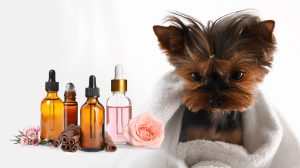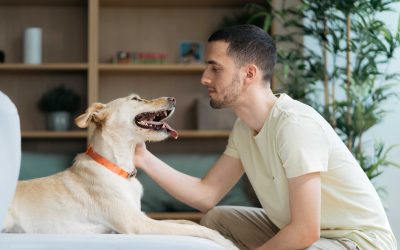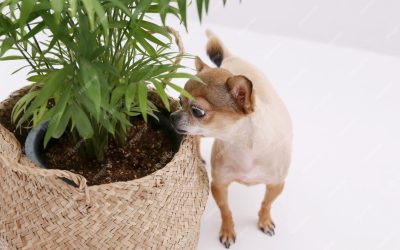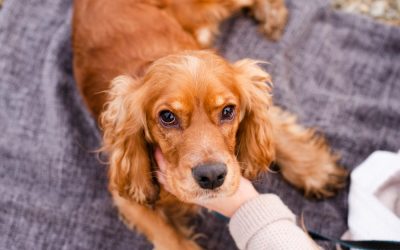Which Essential Oils Are Safe For Dogs, And Which Are Toxic?

Essential oils are concentrated extracts from plants, known for their delightful aromas and therapeutic properties. Dogs, with their incredible sense of smell and unique biology, can be more sensitive to these potent substances than we are, which means that essential oils can offer advantages.
However, some essential oils can be beneficial, while others may pose health risks. Let’s dive into the world of essential oils for dogs, exploring both the benefits and the precautions needed to keep your pup safe.
What Essential Oils Are Safe for Dogs?
As veterinarian Sandra C. Mitchell, DVM, DABVP, stated in this article: “While some essential oils are considered “safer” than others for dogs, you should still always use them sparingly, and only after consulting with your veterinarian. Oils that are tolerated by one animal may not be as well tolerated by another one.
Some of the oils that fall into this pet-safe category include:
- Lavender
- Chamomile
- Myrrh
- Ginger
- Rosemary
- Bergamot
- Frankincense
What Essential Oils Are Bad for Dogs?
Perhaps the easiest starting point is to eliminate the essential oils that you should completely avoid because they are bad for dogs.
Oils that can be toxic from both ingestion and skin exposure include:
- Cinnamon
- Clove
- Hyssop
- Citrus
- Pennyroyal
- Peppermint
- Pine
- Sweet birch
- Tea tree (melaleuca)
- Wintergreen
- Ylang ylang
- Lemongrass
These varieties should be avoided both as a liquid potpourri product as well as an essential oil.
Other oils may cause problems if ingested or placed directly on the skin.
Never put any essential oil or oil product directly on your dog’s coat.
This even includes products that have been marketed for pets, such as flea products. Your pooch may be sensitive to the included ingredients!”
Tips for Safely Diffusing Essential Oils Around Dogs
If you’re considering diffusing essential oils, it can be a lovely way to enjoy their benefits while keeping your home fragrant. Here are some friendly tips for safe diffusion:
- Choose Pet-Safe Oils: Stick to oils known to be safe for dogs, like lavender and chamomile.
- Dilution is Key: Always follow dilution guidelines to prevent overwhelming your pup’s sensitive nose.
- Keep it Ventilated: Ensure the space is well-ventilated to avoid concentrated vapors that could irritate your dog.
- Watch Your Pup: Keep an eye on your dog while diffusing. If they seem uncomfortable, stop the diffusion and consult your vet.
- Limit Diffusion Time: Give your dog breaks from essential oil diffusion to allow them to breathe fresh air.
The Benefits of Lavender Essential Oil
Among the safe options, lavender oil shines as a versatile ally for dogs. Here are some ways it can help:
- Anxiety and Stress Relief: Lavender oil is a go-to for calming anxious pups during loud events, like thunderstorms or fireworks.
- Sleep Aid: The soothing scent of lavender can help improve sleep quality for restless dogs.
- Skin Soothing: When diluted properly, lavender oil can soothe minor irritations and support healing.
- Flea and Tick Repellent: Diluted lavender oil can act as a natural deterrent for fleas and ticks when applied to your dog’s coat.
As always, ensure that lavender oil is used safely and consult your vet for guidance on how to apply it correctly.
Recognizing Symptoms of Essential Oil Poisoning in Dogs
Veterinarian Sandra C. Mitchell, DVM, DABVP, also stated that:
“If your dog gets into any essential oils, you should contact your veterinarian immediately.
If possible, take the bottle of the product with you, or text/email a photo for advice.
Your veterinarian will probably recommend contacting the Pet Poison Helpline (855) 764-7661) for additional guidance.
Treatment required will depend on what product was involved, how your dog was exposed (such as inhalation versus ingestion versus skin contact), and how large the exposure.
Signs that your dog may have been poisoned can include:
- Difficulty breathing
- Trouble walking
- Drooling
- Lethargy
- Weakness
- Muscle tremors
- Nausea and vomiting
- Pawing at the mouth
- Incoordination
- Redness of the lips, gums, tongue, or skin, which may progress to burns
You may also be able to smell the essential oil on the dog’s coat or breath.
Because these products can be quickly absorbed, it’s important not to delay treatment. If you think your dog may have been exposed, seek care promptly—and remember to take the product with you, if possible.”
How Can Pet Insurance Help You if Your Dog Needs a Treatment?
Pet insurance can be a valuable tool in managing the costs of treating a dog’s veterinary expenses. By having a pet insurance policy in place, you can have peace of mind knowing that you can provide medical care for your furry companion without worrying about the financial burden. Pet insurance can help cover the costs of veterinary consultations, diagnostic tests, medications, and even specialized treatments if required.
Reimbursement
This method is the most common for pet insurance companies. You pay out of pocket for the veterinarian bill, and then the insurance company reimburses you for what’s covered under the insurance plan. The steps look like this.
- You pay the vet bill after your dog’s visit.
- You fill out the pet insurance claim form.
- Submit the claim form and other required documentation to the insurer.
- After the claim is approved, you will be reimbursed for eligible expenses.
What Does Odie Pet Insurance Cover?
Pet insurance covers various veterinary expenses, providing financial protection and peace of mind for pet owners. Here are the details of the coverage options offered by Odie Pet Insurance:
Illness & Injury Plan
The Illness & Injury Plan is an all-inclusive insurance plan designed to cover a wide range of medical needs for your pet. This plan includes comprehensive coverage for various illnesses, injuries, and veterinary services. Some of the covered items include:
- Veterinary exams and consultations
- Diagnostics (e.g., X-rays, lab tests)
- Prescribed medications
- Surgeries and hospitalization
- Rehabilitation, acupuncture, or chiropractic treatments
- Medically necessary supplies
- Euthanasia and cremation
The Wellness Plan
The Wellness Plan is a monthly membership that focuses on preventive care and covers routine veterinary services.
- Provides reimbursements for routine care items such as wellness visits (exams and vaccines), testing and parasite prevention, dental cleanings and at-home dental care, vitamins, supplements, and more.
- Through Odie’s partnership with Petivity, a leader in smart pet products and proactive care, Wellness Plan members can also receive reimbursements for Petivity devices and health kits, as well as eligible Purina food and supplements.
- Total reimbursement up to $700 per year.




